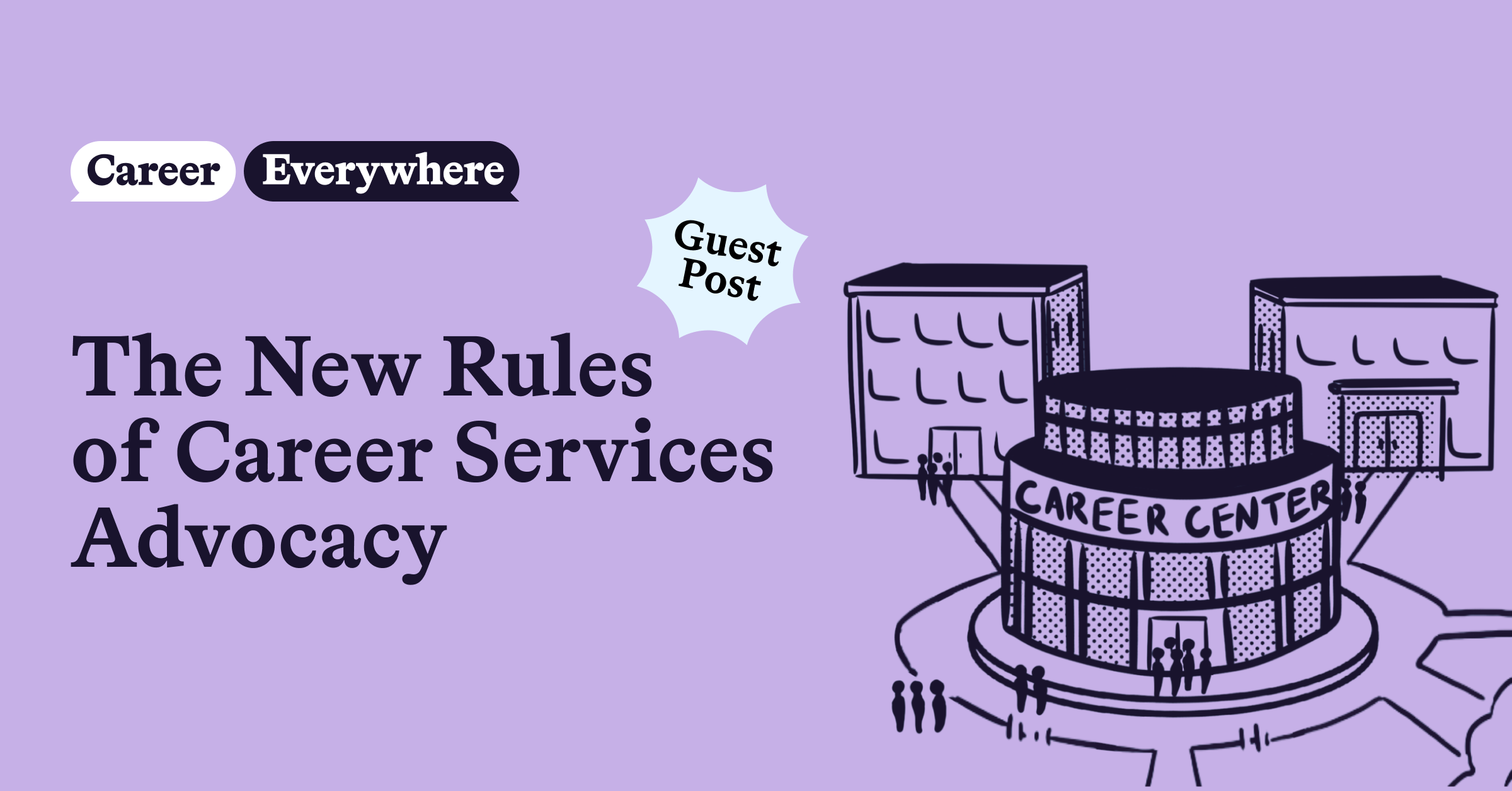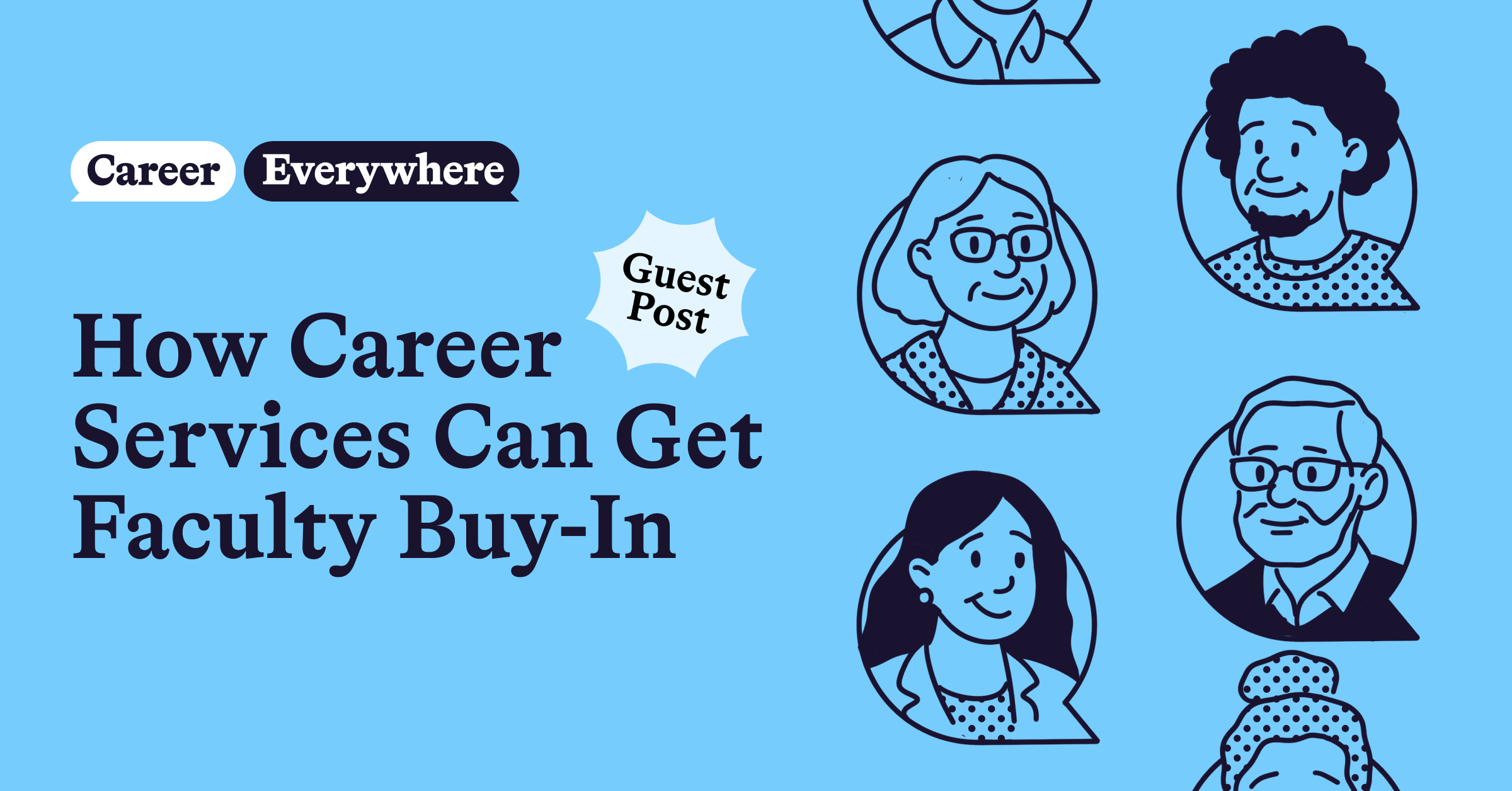
With an estimated 15-20% of the world’s population being neurodivergent, it’s more critical than ever for career services teams to make sure their programming, resources, and other offerings are as inclusive as possible.

This is especially important as the unemployment rate for neurodivergent adults is as high as 30% or 40%, according to CNBC. While strides have been made to support neurodivergent job seekers through specific hiring plans at companies like Microsoft, Ford, and JP Morgan Chase, structural adjustments at the post-secondary education level from career services professionals can offer even more aid to neurodivergent students—while they’re still in school.
For this article, we talked with Jackie Warner, the Assistant Director of the Center for Career Success at Thomas Jefferson University. Warner is a former special education teacher with a master’s degree in severe autism and regularly speaks on neurodiversity-related topics.
We’ll walk through what neurodiversity is, what unique challenges neurodivergent students face in terms of career development, and how career services can help.
What is neurodiversity?
So what exactly is neurodiversity? As Warner puts it, “Neurodiversity is the infinite diversity in our brains in the way that we think and experience the world. How do you function? How do you feel sensory-wise in the world? How do you interact with people, places, and things?”
Neurodiversity includes several neurological and mental disorders such as autism, ADHD (attention-deficit hyperactivity disorder), dyslexia, dyscalculia, dyspraxia, dysgraphia, and Tourette syndrome. Neurodiversity can also include mental health conditions such as anxiety, depression, OCD (obsessive-compulsive disorder), and more. These disorders may affect a person’s behavior, social interactions, and thought processes, along with their ability to process written language and numbers, to write, or influence their movement or coordination.
With all of that considered, the academic and social norms of a university or college (or a career services office) may be challenging for neurodiverse students who interact with the world differently than their neurotypical peers.
What unique challenges do neurodivergent students face in terms of career development?
While neurodivergent students face many challenges when it comes to career development (and post-secondary education, in general), perhaps the most difficult challenge of all is getting a diagnosis.
Neurodivergent students face countless barriers, such as being able to afford appointments and treatment, securing transportation to doctor’s offices, or dealing with the complications of self-identifying in a college environment. Even being able to recognize and prioritize one’s mental health can limit a student’s ability to get diagnosed and become eligible for accommodations under the Americans with Disabilities Act.
“Some of the other things that our students face specifically with career services is the frustration of just sitting down and doing it—making the resume, writing the cover letter,” Warner said. “For some people who are neurodiverse, especially those with dyslexia and dysgraphia, how difficult is it to read and to write and to just get it done? It’s so difficult.”
Social communication itself can also act as a barrier, as many neurodiverse individuals may struggle with social cues and other behaviors when seeking help.
How can career services professionals support neurodivergent students?
First and foremost, allyship is paramount to fostering effective relationships with neurodiverse students. Simply offering your presence to someone who needs a listening ear, guidance, or other forms of support can make a world of difference in a student’s confidence, comfort, and success.
Additionally, it is essential to remember that disclosure of neurodiversity from a student should be treated as confidential information, and does not require contact with an accommodations department or disabilities office on campus.
Instead, it can be helpful to thank the student for sharing that information with you and then prompt them with an open-ended question about how you can best support them. Some students may disclose this information to you because they need help with seeking accommodations, while others may simply want to provide a disclaimer for certain behaviors.
“If a student tells you, ‘Hey, I really need to take notes, can you please take a break in between talking, or talk slowly, or just let me write that down,’ or ‘I really need to edit this while you’re talking, can you give me a moment to fix that?’ Or even, ‘Hey, I see you made notes on my resume, could you email that to me?’ Those are really easy things that students might ask for,” Warner said.
“And we might say, ‘Well, no, you’re an adult and that’s extra work for me,’ but we don’t know why they’re asking that. They could be asking that because they’re neurodiverse. That’s an easy accommodation we can make for all of our students, is just listening to what they need and believing them.”
Reevaluating your communication patterns, both verbal and written, can also aid in supporting neurodiverse students, said Warner,
Cutting out fluff, being more direct, and using simplified language in-person and/or digitally that is less likely to be misconstrued or misunderstood is a simple, yet highly effective way to ensure that students are receiving accessible information and resources. For example, when providing feedback on application materials, phrasing an edit for a student as “This bullet point needs editing for clarity” is much clearer and more literal than “Let’s get to the meat of things for this bullet point,” according to Warner.
When it comes to social situations and highly stimulating environments like networking events or career fairs, a “quiet room” can also provide support for students with anxiety, ADHD, or other disorders that may influence their ability to self-regulate fear, worry, or unease that is often associated with job-searching, networking, career fairs, and other interactions. Providing a private, calming, and easily accessible space allows students to collect their thoughts, review important information, or take a needed break at any point during the event, potentially increasing their confidence and ease that can make a world of difference for first impressions.
Providing maps ahead of the event (especially for career fairs) can also help students create a game plan, allowing them to use their time more effectively, meet with the employers they’re most interested in, and reduce stress and anxiety.
For more information on how to best support neurodivergent students and others with disabilities, check out this support toolkit PDF Warner created.
What accommodations can career services make for neurodivergent students?
Making materials, resources, and interactions more accessible is the foundation for providing a supportive office for neurodivergent students.
Ensuring that information can be accessed in multiple formats or through multiple methods, such as through a university website, Canvas, Handshake, or a virtual career center (powered by uConnect), allows students to find the best method for them to learn and apply the resources. Offering multiple meeting formats such as Zoom, phone, or in-person can also encourage students to reach out and take the initiative to meet in whatever way is most comfortable and effective for them.
“Some people find it difficult to make eye contact, and it’s easier to look like you are on Zoom. Some people prefer phone meetings because they feel like they have trouble reading social cues, body language, and facial expressions,” Warner said. “It’s just easier to hear the words and not even have to worry about, ‘Oh, what does somebody look like right now? Are they angry with me? Are they not angry? I can’t really tell.’”
Different methodologies for accessing information and resources are also helpful, as certain students may process information differently- i.e., visually or audibly through graphics, videos, and/or podcasts.
Ultimately, learning to recognize signs of distress, fear, discomfort, or overwhelm from a student can help in choosing the next best step, if only to take a break, sympathize, or redirect your plans to a more realistic and achievable approach for that student.
For more details about how Thomas Jefferson University supports neurodivergent students, check out Warner’s episode of the Career Everywhere podcast.
How can career services make programming more inclusive for neurodivergent students?
For some neurodivergent students, the way information is presented physically can influence how well it is received or processed.
To make programming more accessible for all students, career services teams can do a few things:
- Make programming materials and notes available ahead of time
- Provide paper copies of PowerPoint slides (or similar materials) for note-taking
- Offer a general outline of the program
- Make sure materials have a readable size and font (and with enough contrast)
- Provide closed captioning and/or an ASL interpreter
- Use a microphone when speaking
- Avoid distracting elements like flashing lights or unnecessary sounds
- And more
As always, intentionality is key.
Conclusion
Neurodivergent students face many obstacles as they pursue higher education and career development. Through accommodations, intentionality, and empathy, career services teams can create more inclusive and accessible physical and virtual environments, one-on-one coaching, and programming for all.
Interested in providing more curated, accessible career resources for neurodivergent students? Check out our new Curation Kit! The kit includes articles, events, videos, podcasts, jobs, internships, and more—all vetted and curated for neurodivergent students. Learn more here.


